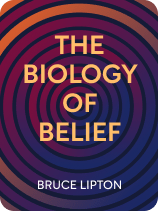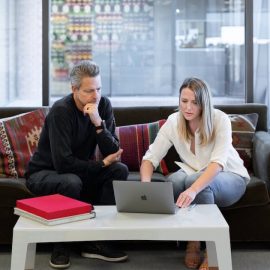

This article is an excerpt from the Shortform book guide to "The Biology of Belief" by Bruce Lipton. Shortform has the world's best summaries and analyses of books you should be reading.
Like this article? Sign up for a free trial here.
What are Bruce Lipton’s energy psychology techniques helpful for? How can you improve healing for your children and your community?
In The Biology of Belief, Bruce Lipton says that your actions are triggered by unconscious programming that’s been embedded in you since early childhood. But he’s optimistic about our individual and collective capacity for change.
Find out how you can use energy psychology to change people’s lives for the better.
Implications for Healing
We have the capability to reprogram our minds and to do better for our own children, and we should join together as a global community in our healing efforts. Here we’ll look at the advice on energy psychology Bruce Lipton offers based on what he’s learned from his work with cells.
(Shortform note: While joining together as a global community is a worthy goal, it would require explicitly addressing cultural, social, and economic disparities that hinder collective progress. This would mean tackling systemic inequalities built into social institutions to ensure more lasting and equitable improvements. For example, UNESCO argues that investing in education can be a way to overcome inequalities by teaching skills that foster mindsets of adaptability, inclusivity, appreciation for diversity, and social responsibility.)
Individual Healing: Programming and Reprogramming
On the individual level, Lipton offers two major pathways for healing: 1) approaches to parenting that program our children’s minds in healthy ways, and 2) ways to reprogram our own minds with mindfulness and “energy psychology” techniques.
Program Your Children’s Minds
The most obvious way we can do better for future generations is by being more conscious and intentional about the programs we’re embedding in children’s minds. Lipton says to try to remain consciously aware that you didn’t just pass on your genes through the reproductive process—you’re actually genetically engineering your children during their childhoods. What you embed in your children’s minds has the capacity to influence the way their genes are expressed throughout their lives.
So if you have, or plan to have, children or grandchildren, here are a few things Lipton suggests:
- Begin with a healthy prenatal environment. Your influence on your children begins before they’re born. Lipton cites studies that link physical and mental disorders such as osteoporosis, psychosis, and mood disorders to prenatal and perinatal environmental influences. Expectant mothers should be aware that their behaviors and moods influence the environment in which their child is forming.
- Create as calm, supportive, and safe an environment as possible for your children. Your children will pick up on negativity, such as anger and fear, in their environment, and their own bodies will respond to this by producing the associated chemical environment.
- Give ample physical love and nurturing affection. Lipton points out that anthropologists have noted that the most peaceful societies tend to indulge their children when very young, holding them most of the day. By contrast, those that don’t show much physical affection to children tend to be more violent.
- Encourage creative and cooperative play over competitiveness. This fosters the natural human instinct toward cooperation for survival, and engaging in creative pursuits can encourage the brain to move into a state of “flow,” which are associated with theta waves.
Reprogram Your Own Mind
Whether you have children or not, addressing your own subconscious programming is also crucial. Lipton says there are many techniques to rewrite your mental programs, including mindfulness techniques and some newer “energy psychology” methods.
Practice Mindfulness
Mindfulness is essentially a process of bringing your conscious and subconscious minds into harmony. Lipton explains that we don’t have to be at the mercy of our subconscious programming, because our conscious minds have the capacity to step in and direct the show. But that takes hard work because our conscious minds are used to wandering much of the time.
As Lipton explains, when your conscious mind is busy thinking about the past or the future (which is most of the time), your subconscious is left in control of the present. This means it’s constantly making decisions and interpreting the world based on your childhood programming. Your conscious mind is only in charge when it’s fully engaged in the present moment. So, Lipton says, undertaking a mindfulness meditation practice can help you train your conscious mind to stop wandering and take charge of the decisions you make.
Explore Energy Psychology Techniques
The term “energy psychology” applies to several different techniques and methods for reaching into your subconscious mind—for example, hypnosis, neuro-linguistic programming (NLP), and kinesiology (the study of body movement) are among them. Lipton doesn’t discuss many of these methods in detail, but instead directs the reader to his website for more information.
The important thing to know about these methods is that they use implicit messaging (sometimes called “subliminal” messaging) to reach your subconscious and overwrite the existing programs. As mentioned above, this is most effective when one is in a theta brain wave state. The theta state is associated with deep meditation and hypnosis, so energy psychology methods often involve an attempt to shift your brain waves from their normal alpha state to the lower-frequency theta state.
However, Lipton points out that you have access to a theta wave state every day—just as you are falling asleep at night, you slip into theta waves before you drop into the delta wave sleep state. This offers you an opportunity every night to get some implicit messaging into your brain. You can do this by listening to meditations and affirmations designed to imprint positive thoughts into your brain as you enter this programmable state.
Collective Healing: Hope for the Future
Finally, Lipton says he’s optimistic about the future of humanity, based on the history of life on the planet and how resilient it can be when it joins together in cooperative communities. He says we can learn a lot from cells about how to move forward as a global human community.
Life on Earth consisted only of single-celled organisms for billions of years before they began joining together to form multicellular clusters, which eventually became the complex higher life forms we have today. Lipton suggests that it was likely some sort of environmental change that created pressure for those single-celled organisms to join together to increase their chances of survival. Cooperation in this way helped them survive because when they were joined, their collective membrane surface area increased, giving them greater ability to detect and respond to environmental threats. He says cells give us a model for understanding how joining together in cooperative community may give us our best chance for survival.
Lipton points out that humanity’s survival is threatened because of our own destructive behaviors. We’ve radically altered the environments we evolved in, so that means we’re now living in an environment we’re not adapted to. And when that happens to any living organism, it has only two options—die or change. Lipton suggests we join together as a global community and make the necessary changes to ourselves. At the cellular level, we’re all exactly the same—human. We must let go of the false concepts that divide us and, like our single-celled ancestors, join together as one to find a new way to thrive.

———End of Preview———
Like what you just read? Read the rest of the world's best book summary and analysis of Bruce Lipton's "The Biology of Belief" at Shortform.
Here's what you'll find in our full The Biology of Belief summary:
- That your mindset matters more than your genetics when it comes to health
- How your thoughts affect your immune system and hormones
- Why humans should join together in a community to aid survival






